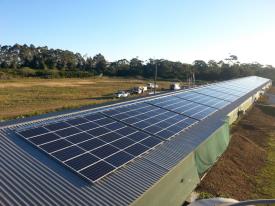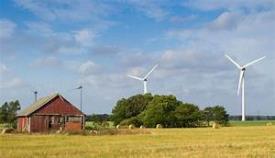 The Commodity Futures Trading Commission (CFTC) recently completed a comprehensive review of the effect of climate change on our economy. The report entitled “Managing Climate Risk in the Financial System” was commissioned by the Board of the Commission comprising three Republican and two Democratic members who voted unanimously 12 months ago to create an advisory panel to report on the effects of global warming. The document includes contributions by analysts affiliated to large investment firms including Morgan Stanley, S&P, and Vanguard, the oil-giants BP and Conoco Phillips and commodity trader Cargill with assistance from environmental and agricultural specialists in academia.
The Commodity Futures Trading Commission (CFTC) recently completed a comprehensive review of the effect of climate change on our economy. The report entitled “Managing Climate Risk in the Financial System” was commissioned by the Board of the Commission comprising three Republican and two Democratic members who voted unanimously 12 months ago to create an advisory panel to report on the effects of global warming. The document includes contributions by analysts affiliated to large investment firms including Morgan Stanley, S&P, and Vanguard, the oil-giants BP and Conoco Phillips and commodity trader Cargill with assistance from environmental and agricultural specialists in academia.
It has been the consistent policy of the Administration to downplay global warming despite credible scientific evidence from atmospheric, oceanic and terrestrial studies. The report apparently notes the devastation associated with climate change including wildfires, storms, droughts, floods and hurricanes all of which affect insurance and mortgage markets, pension funds and other financial institutions. The report incorporates recommendations for some reversal of current Administration policy regarding environmental deregulation.
 The question is whether the report will precipitate rethinking among the Administration, many of whom are climate change deniers despite the scientific evidence and facts. The second consideration is whether corporate or Congressional action will be taken as a result of the findings of the report. The CFTC Commission has not yet voted to accept the report. A White House spokesperson commented that the report does not necessarily represent the opinions of the Federal government.
The question is whether the report will precipitate rethinking among the Administration, many of whom are climate change deniers despite the scientific evidence and facts. The second consideration is whether corporate or Congressional action will be taken as a result of the findings of the report. The CFTC Commission has not yet voted to accept the report. A White House spokesperson commented that the report does not necessarily represent the opinions of the Federal government.
Irrespective of political inclination, those of us who have children and grandchildren must recognize that the World’s use of fossil energy over the past 150 years has degraded the environment. The reliance on coal, oil and to a lesser extent gas has resulted in quantifiable atmospheric and terrestrial  changes that are influencing climate, health and availability of resources. The challenge will be to convert to more environmentally friendly sources of energy including nuclear power and renewables at a cost and within a time-line that does not disrupt our economy or degrade our standard of living. The first imperative is to recognize the problem and then to develop appropriate corrective measures. Since climate change is a global phenomenon it will be necessary for the U.S. to assume a leadership role in cooperating with other nations to resolve problems that are becoming readily more apparent.
changes that are influencing climate, health and availability of resources. The challenge will be to convert to more environmentally friendly sources of energy including nuclear power and renewables at a cost and within a time-line that does not disrupt our economy or degrade our standard of living. The first imperative is to recognize the problem and then to develop appropriate corrective measures. Since climate change is a global phenomenon it will be necessary for the U.S. to assume a leadership role in cooperating with other nations to resolve problems that are becoming readily more apparent.